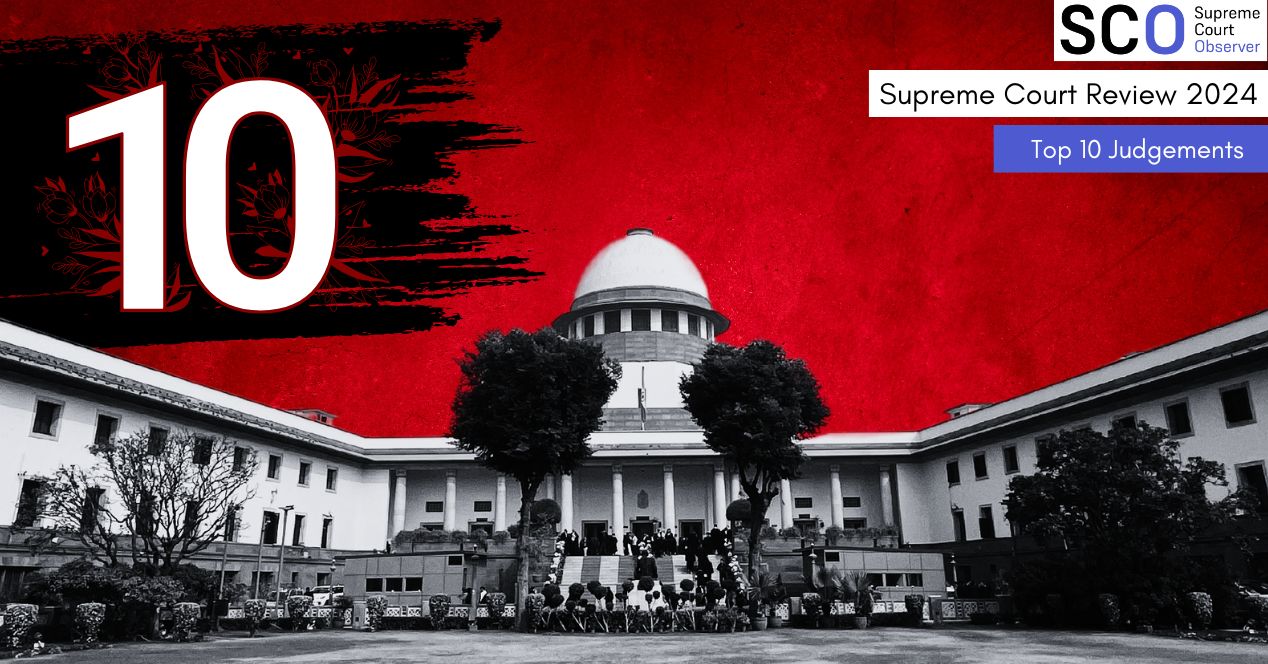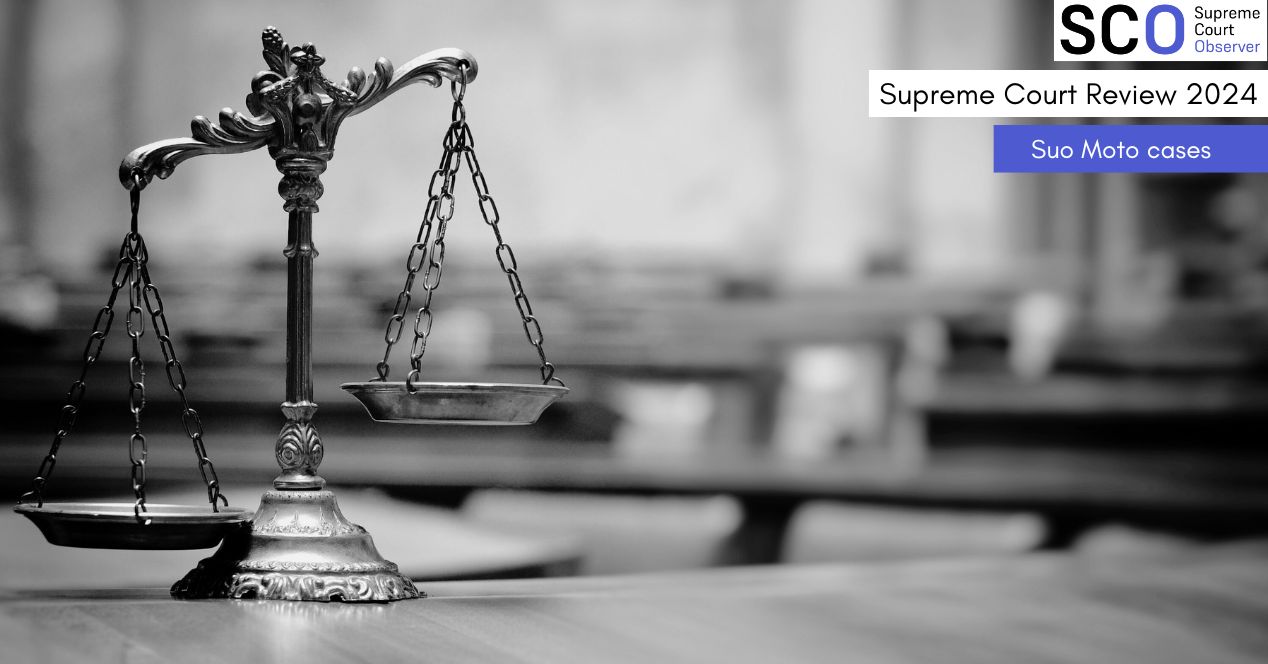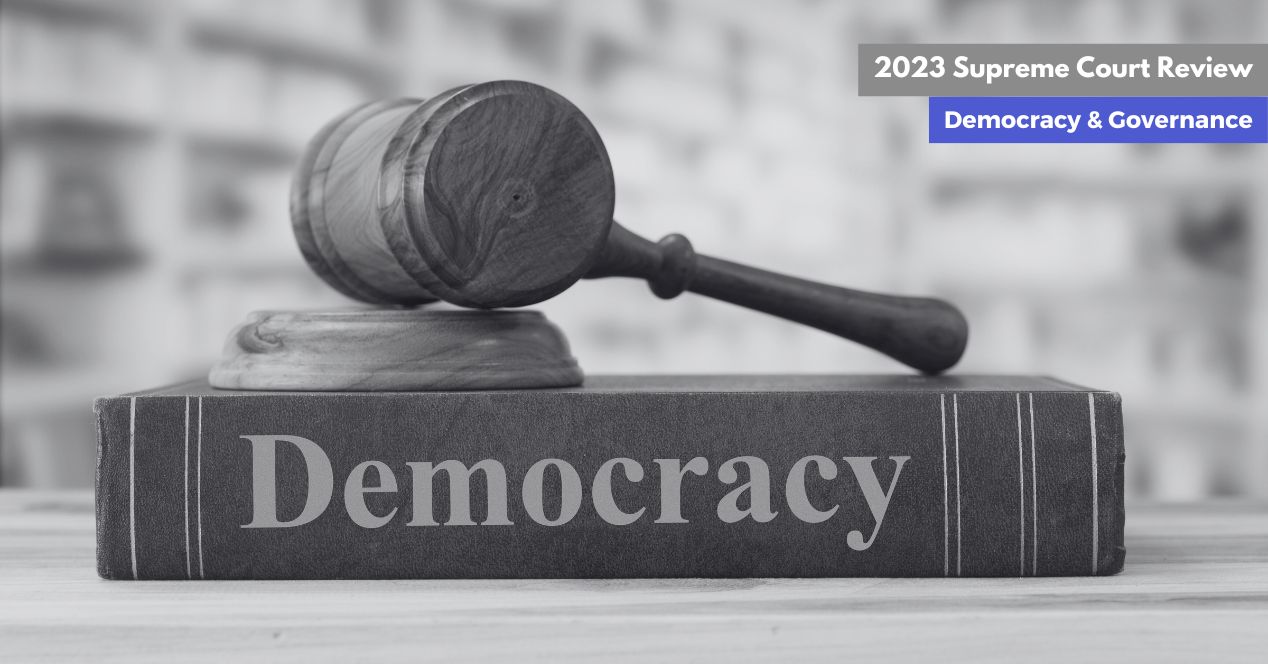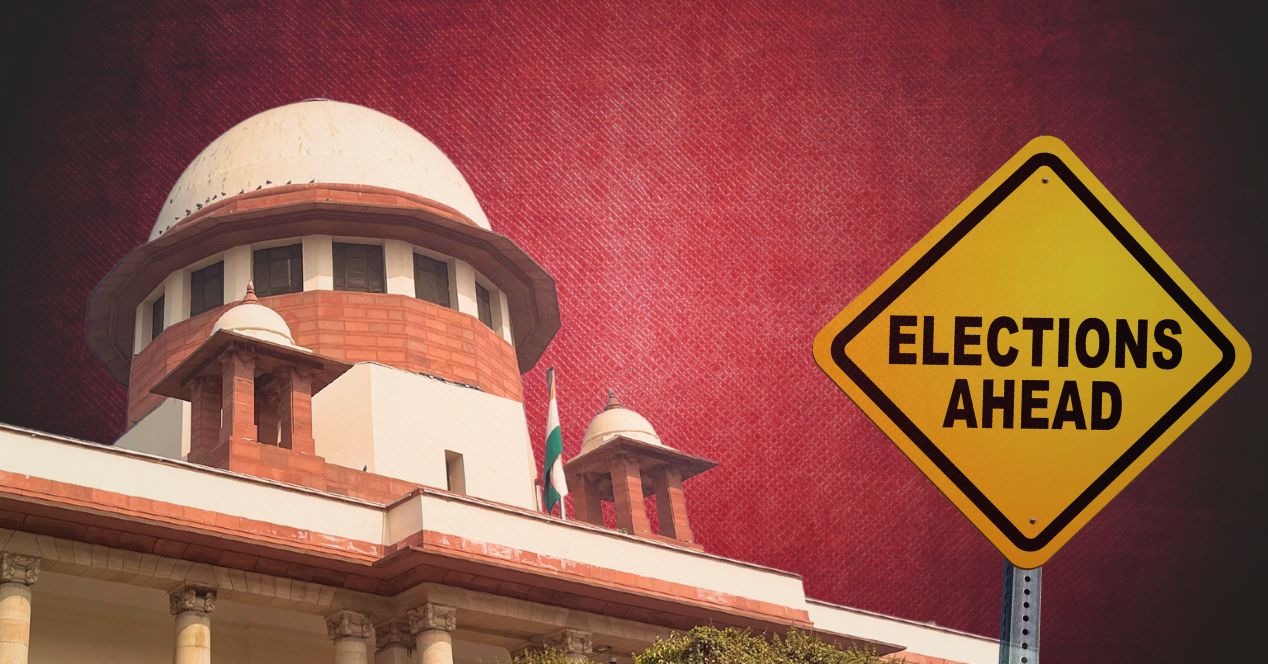Analysis
Supreme Court Review 2024: Democracy on trial in an election year
We revisit notable judgements and petitions that occupied the top court’s attention during election season
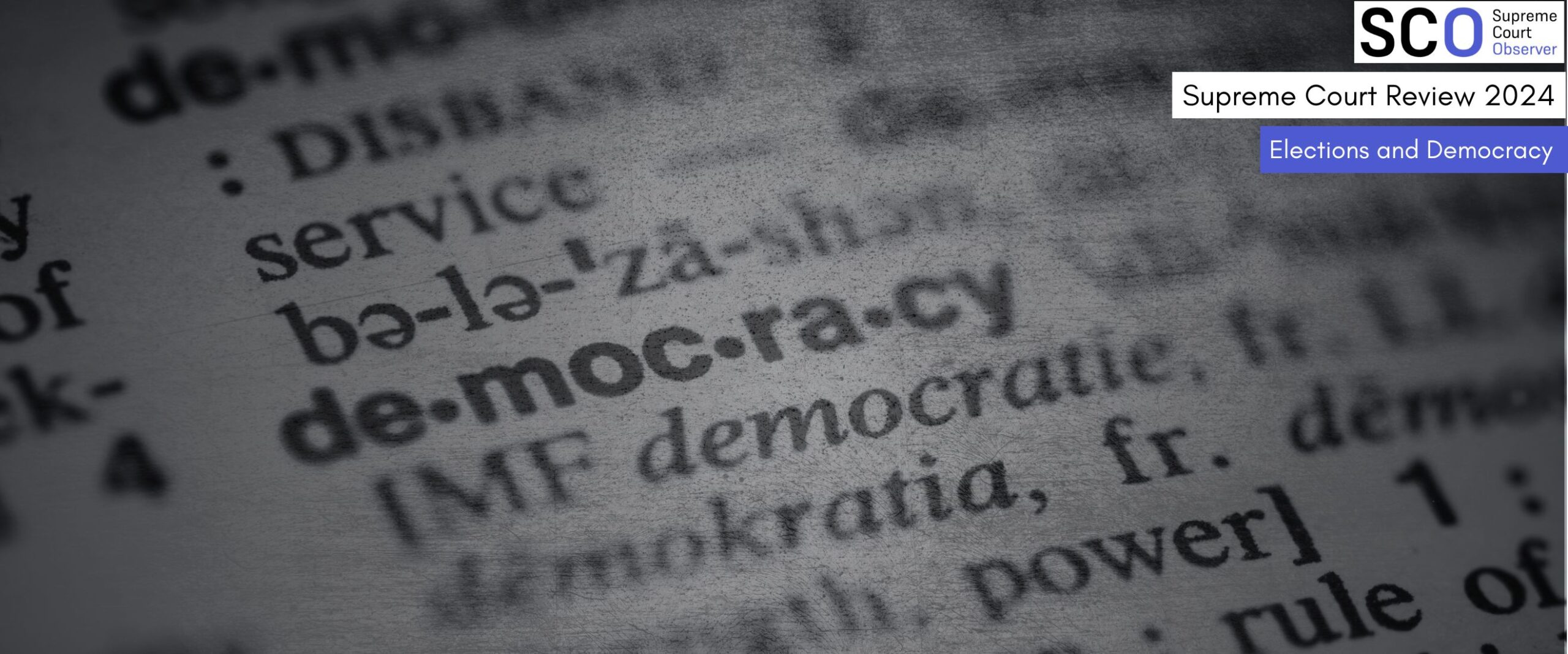
In February 2024, a few weeks before India went to the polls, we at the Supreme Court Observer identified five election-related cases pending before the Supreme Court. Among them, two saw significant developments during the year—the challenge to the Electoral Bonds Scheme and the case concerning the appointment of Election Commissioners.
This year, there were no big developments in other petitions related to the electoral process, such as those addressing electoral freebies, filling parliamentary vacancies, and the eligibility of candidates charged with serious offences.
Beyond the General Election, the Supreme Court also intervened to address an irregularity in the mayoral elections in Chandigarh.
Here’s a closer look at the election-related cases we tracked in 2024:
The Court’s word is a bond
A five-judge Constitution Bench’s unanimous judgement on the unconstitutionality of the Electoral Bond scheme was one of the most talked-about decisions this year. Delivered two months before the first phase of voting in the General Election, the ruling had significant implications for electoral transparency and accountability. The majority opinion, authored by former Chief Justice D.Y. Chandrachud, found that the Scheme—which facilitated donor anonymity for political party funding—violated the right to information. The Court further ruled that political parties must be answerable to private citizens regarding the sources of their funding.
The judgement held that the Scheme, introduced during the National Democratic Alliance (NDA) government’s first term, was far from “fool-proof.” It suffered from structural gaps that could enable quid pro quo arrangements between political parties and anonymous corporate donors. The petitioners, led by the Association of Democratic Reforms (ADR), had argued that the Scheme disproportionately benefited corporations, given that the majority of bonds purchased were valued at ₹1 crore or higher.
Notably, ADR had earlier sought a stay on the Scheme ahead of the 2019 General Elections, but the Court had refused to scrap it. Instead, political parties were directed to submit donor and transaction details to the Election Commission of India (ECI) in sealed covers. This year, the Court directed the State Bank of India, the sole issuer of the bonds, to disclose comprehensive details including of the purchaser’s identity. The ECI was tasked with making this data publicly available on its website.
The decision also potentially unlocked a new door in fundamental rights jurisprudence by adopting the test of “double proportionality” to balance the right to information of the voter against the right to privacy of the donor. In our newsletter, we wrote that the test of double proportionality may be useful in getting to the bottom of ‘hard cases’ such as the Sabarimala Review, where the right to equality is pitted against the right to religion.
VV-PAT on the back
ADR returned to the Court with another petition seeking 100 percent vote-verification using Voter Verified Paper Audit Trail (VVPAT) slips to cross-check votes cast on Electronic Voting Machines (EVMs). Additionally, ADR suggested reverting to ballot paper voting or enabling voters to self-verify the VVPAT slips. Such a measure could allay suspicions of deliberate miscounting.
One round of voting in the General Election had already taken place by the time arguments began in the case. On 26 April 2024, the same day as the second phase, a bench of Justices Sanjiv Khanna and Dipankar Datta dismissed the case. This was not the first time that a plea seeking 100 percent verification was filed in the Court. A similar petition was dismissed in 2019.
In the present case, Justice Khanna’s opinion noted that the case was an opportunity to clarify the functioning of EVMs and VVPATs. This was aimed to preempt future petitions questioning the legitimacy of the process. The Court provided a detailed explanation of how a vote is cast, recorded, and verified via VVPAT slips.
In his concurring opinion, Justice Datta expressed skepticism about ADR’s motives. He stated that he had “serious doubts as regards the bona fides of the petitioning association”.
As per practice, VVPAT slips are tallied with the votes in five polling stations, chosen at random, in each constituency. The Court noted that no mismatch has been reported until then. Notably, earlier this month and in the context of the assembly elections in Maharashtra, Opposition leaders refired the conversation about a return to ballot papers. The ECI reported that there was no mismatch in the VVPAT slips and votes recorded in the election.
Caught red-handed
On 20 February, the Supreme Court used its discretionary powers to declare Kuldeep Kumar from the Aam Aadmi Party as mayor of Chandigarh. The earlier winner of the mayoral election was Manoj Sonkar of the Bharatiya Janata Party. Kumar alleged that the election results were swung in Sonkar’s favour by tampering of ballot papers by the Presiding Officer, Anil Masih, who also happened to be the general secretary of the BJP’s Minority Morcha. Masih had been caught on camera, making marks on eight ballot papers. The Punjab and Haryana High Court had refused to stay the results, prompting Kumar to appeal.
A bench led by former CJI Chandrachud found that a re-election was not necessary. Instead, the bench counted the tampered ballots and declared Kumar the winner. They held that the Court was “duty-bound” to ensure that electoral democracy was not undermined by “subterfuges.” During the hearings, CJI Chandrachud commented that Masih was looking into the camera and marking the ballot papers like a “fugitive”. He further stated that the Court cannot allow such a “murder of democracy”.
The incident could be an example of the drawbacks of reverting to a ballot paper voting system. In the VVPAT judgement, the Court had endorsed the electronic voting system as it eliminated “booth capturing” and reduced “bogus votes.” It also noted that a ballot system was impractical for an electorate of 97 crore voters. However, critics argue that electronic voting lacks transparency and raises doubts about the legitimacy of outcomes. The Court’s decision in the VVPAT case has sought to address some of these concerns, but the debate surrounding electoral integrity persists.
Tallies and rallies
This petition was heard by a Vacation Bench of Justices Datta and S.C. Sharma after the completion of five out of seven phases of the General Election. ADR sought a direction from the Court requiring the ECI to publish Form 17C within 48 hours after each phase of voting. Form 17C is a document prepared by the Presiding Officer of each polling station, recording the total turnout.
ADR argued that publishing turnout data promptly would allow observers to cross-check the figures against the total number of votes counted. This could dispel doubts regarding the counting process. The petition gained momentum after Opposition parties wrote to the ECI, demanding explanations for delays in publishing turnout numbers for the completed phases.
ADR’s plea originated as an interim application filed in a case initiated by Trinamool Congress leader Mahua Moitra during the 2019 General Election. However, the Vacation Bench observed that issuing such a direction to the ECI midway through the elections would be complex, disruptive and require a lot of “manpower”. Consequently, the bench adjourned the petition to July 2024, after the conclusion of the General Election. There has been no reported development in the case since.
Despite the adjournment, the ECI released the turnout data the very next day, accompanied by a statement denouncing “false narratives” that were allegedly attempting to “vitiate electoral process.”
Election selection
In 2023, in Anoop Baranwal v Union of India (2023), a Constitution Bench led by Justice K.M. Joseph modified the process of appointment of Election Commissioners. The judgement directed that a three-member committee comprising the Prime Minister, Leader of Opposition and the Chief Justice of India select Election Commissioners until Parliament makes a law on the subject.
Parliament passed that law in December 2023. It received President Droupadi Murmu’s assent that same month. The twist was that the Chief Justice of India was replaced on the selection panel by a Union Cabinet minister nominated by the Prime Minister. Ahead of the General Election, Chief Election Commissioner Arun Goel unexpectedly resigned. This prompted petitions from Dr. Jaya Thakur and ADR who sought a stay on the law, on the ground that it went against the spirit of Anoop Baranwal.
On 21 March, the Court refused to stay the law citing the upcoming election. Earlier this month, on 3 December, Chief Justice Sanjiv Khanna recused from hearing the case, stating that the “situation has changed now”. His recusal was in light of him taking over as the Chief Justice, presumably an interested party as one of the members in the Court-directed panel. The petition will now be heard by a new bench in January 2025.

